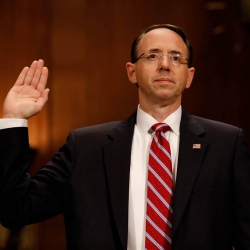U.S. Representative Dina Titus (D-Las Vegas) wrote a letter to Deputy Attorney General Rod Rosenstein, urging him not to reverse an opinion involving online gambling rendered in 2011 by the US Department of Justice.
In 2011, the state attorney generals of New York State and Illinois asked Eric Holder’s Justice Department its opinion on which forms of online gambling the Unlawful Internation Gambling Enforcement Act (UIGEA) banned. From the time the law was passed in 2006 until 2011, the federal government viewed the UIGEA as a ban on online casinos, poker sites, and sportsbooks.
As it is written, the UIGEA bans any form of gambling activity performed over the Internet which was banned over telephone lines under the 1961 Wire Act. The Wire Act specifically noted interstate sports betting as illegal, a provision which was used to prosecute organized crime members who acted as illegal bookmakers over the decades. Because poker and casino games betting was not transacted over the phone lines, such activities were not mentioned in the 1961 Wire Act.
The reply by the Department of Justice in 2011 was the UIGEA banned online sports betting, but not online casinos or online poker. The logic was simple: The Wire Act made no mention of those forms of betting. Opponents of that decision claims that it is common sense that the Wire Act would ban all interestate gambling — and thus all Internet gambling — but the law did not require enforcement of poker, blackjack, roulette, and other casino games.
Dina Titus’s Letter to Rosenstein
In her letter to Rod Rosenstein, Rep. Dina Titus argued that a reversal of the 2011 DOJ opinion would harm Nevada and other states which have legalized online poker and/or online casinos. Those states collect revenues from legal and licensed online gambling sites, while local business operators have invested millions of dollars to build those businesses.
Titus’s letter said, “In Las Vegas, we have seen that a regulated market is always better than an illegal one. Internet gambling will not go away with a reversal of Wire Act guidance; it will merely push more consumers into black markets.”
Banning iGaming Would Not Stop It
The US congresswoman noted that a ban on online gambling does not stop such activity. Instead, it drives out legitimate operators which receive state licensing, institute consumer protections and age verification protocols, and provide problem gambling resources, including self-exclusion lists, free helplines, and counseling for gambling addicts and their families.
Banning such activity would mean illegal offshore online casinos and poker sites could still operate, thus setting up a situation where problem gamblers would be harmed. Reversing the 2011 decision would put more money into the hands of unaccountable site owners who remain beyond the reach of US authorities. In such an underground economy, organized crime and other criminal elements would flourish.
Lindsey Graham and Dianne Feinstein
Dina Titus’s letter to Rod Rosenstein is a response to a similar letter sent to the Department of Justice late last year by U.S. Sen. Lindsey Graham (R-South Carolina) and U.S. Sen. Dianne Feinstein (D-California). The two senators asked US Attorney General Jeff Sessions and Rod Rosenstein to reverse the 2011 opinion.
Jeff Sessions’ Stance on Gambling
The matter is concerning to Rep. Dina Titus and other pro-online gambling advocates, because Sessions and Rosenstein each have been hostile to online gambling in the past. In his Senate confirmation hearings, then-Sen. Jeff Sessions said he was “shocked” when he heard the Eric Holder’s DOJ declared online casinos and online card rooms legal. Sessions has old-fashioned views on “vice crimes” like gambling and marijuana use.
In the case of marijuana usage, Jeff Sessions has taken punitive measures to reverse decades of more progressive pot laws. Late in 2017, Sessions told US Attorneys’ Offices they could charge pot users in states which have legalized marijuana use for federal drug crimes. Dina Titus is concerned that Jeff Sessions’ Department of Justice will issue a similar unilateral command to US attorneys.
Rod Rosenstein v. Calvin Ayre
Deputy Attorney General Rod Rosenstein has a more lengthy history of anti-gambling enforcement. When he was the US Attorney for Maryland, Rod Rosenstein brought a number of high-profile cases against online gambling operators. The most significant of those was a 2012 case against Calvin Ayre, the Canadian-born founder and former owner of Bodog. Despite Ayre selling Bodog years before, Rosenstein brought a case against the Antigua-based billionaire, claiming he licensed the Bodog brand to operators who illegal signed up American players.
Only after Rod Rosenstein left the Maryland attorney’s office for his current post was Calvin Ayre able to settle the 2012 charges. Ayre dealt with a more reasonable judge, who dropped most of the charges and let Calvin Ayre off with a fine.
Thus, US Rep. Dina Titus is doing the US online poker and casino industry a service by arguing their case to Rod Rosenstein and the US Department of Justice. If they took precipitous action, the states of New Jersey, Pennsylvania, and Delaware would be affected. While those states might take the DOJ to court, it would be an uncertain time for US online gamblers.

